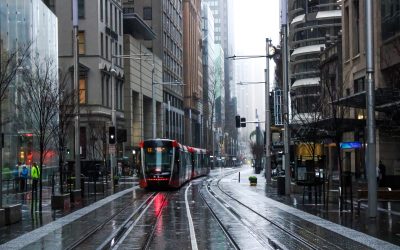5 inspiring women making waves as UTS Alumni
Happy International Women’s Day! This year’s theme is #BreakTheBias, so today we’re reflecting on all the ways our incredible women UTS Alumni have been forging careers to create a world free from bias, stereotypes and discrimination.
From fighting against gendered violence, to creating inclusive policies for people experiencing disability, to sharing stories about collective human experiences, all the women listed below are using their careers to work towards a society that is diverse, equitable, and inclusive.
Read on to find out more about just five UTS Alumni 2021 Award recipients worth celebrating this International Women’s Day.
Amani Haydar

Amani Haydar is a lawyer, writer and artist who makes a remarkable contribution to the community through her professional, volunteer, creative and advocacy work – despite having faced incredible trauma in her personal life.
Amani has been a passionate advocate and campaigner for ending violence against women since her father murdered her mother in 2015. She takes a multidisciplinary approach to raising awareness about gender-based violence, law, policy and the effects of structural inequality on women.
“I would like to see greater sensitivity towards victims of crime and a deeper appreciation of the factors that shape the experience of homicide victims and witnesses in the legal process. I’m interested in how we might provide more holistic responses to people who have trauma as a result of crime victimisation.”
Melanie Briggs

Melanie Briggs is a trailblazer who is making a profound difference to the health of Indigenous mothers and babies in her region. A descendant of the Dharawal and Gumbaynggirr people, Melanie was the first endorsed Aboriginal midwife in NSW and is one of only two endorsed Aboriginal midwives in Australia.
Melanie is a senior midwife at Waminda South Coast Aboriginal Women’s Health and Welfare Corporation and heads up the Minga Gudjaga ‘Mother and Baby’ Maternity Service. Recognised as a model for ‘Closing the Gap’, Waminda is Aboriginal-led and community controlled, and guided by the principles of self-determination. Melanie is the lynch-pin of the maternity service, providing cultural guidance and leadership to other midwives and members of the research team.
“I want to see Aboriginal women birthing on their homelands, claiming their sovereign birthing rights, practicing traditional lore and continuing cultural connections to country for their baby and their families. Aboriginal women and families being valued, respected and validated for their knowledge of over 60,000 years of birthing bloodlines of the oldest living civilisation on earth.”
El Gibbs

El is passionate about the meaningful involvement of people with disability in public policy and public life. She has devoted over fifteen years to working in policy, strategy and advocacy for the rights of people with disability and is a highly respected expert in the media and policy.
El was part of the team that campaigned to establish the Royal Commission into Violence, Abuse, Neglect and Exploitation of People with Disability — the largest of its kind in Australian history. Her live analysis of the Royal Commission hearings on Twitter made them markedly more accessible. El also presented evidence to in her role as director of media and communications for People with Disabilities Australia (PwDA), a national organisation run by and for people with disabilities.
“I am determined to see more disabled people leading the organisations that represent us, and for more of us to be building a world that fits disabled people, rather than expecting us to fit into a non-disabled one.”
Karen Mundine

Karen has shaped the national journey towards a just, equitable and reconciled Australia. A proud Bundjalung woman, she has been involved in reconciliation for several decades, culminating in her appointment as CEO of Reconciliation Australia in 2017.
Born into a family that raised the bar in Aboriginal activism – her mother Kaye and two aunties, Olive and Ann, were trailblazers – Karen felt the pressure of expectation and responded by quietly learning, achieving and giving back.
Karen is known as a leader who will always preference action in social justice over public profile, and responsibility to community over individualism. She has been instrumental in the development of some of Australia’s watershed national events including the Apology to the Stolen Generations, Centenary of Federation commemorations, Corroboree 2000, and the 1997 Australian Reconciliation Convention.
Alana Valentine

Alana Valentine is one of Australia’s most highly respected playwrights whose visionary work puts the human experience squarely on centre stage.
Throughout her distinguished career, Alana has collaborated with a host of Australian communities to ensure a diverse range of marginalised voices are heard. With care and sensitivity, she has developed works with a long and original list of real people with real stories – including women incarcerated in managed care for being ‘uncontrollable’, prison inmates and their families, high school children who have been cyberbullied, flood victims, and Pitjantjatjara dialysis patients.
In 2021 Alana wrote and directed the Sydney Festival/Walkley Award series The Journalist Gene, innovatively incorporating interview panels as a performance element. In April 2022 Belvoir will present her commissioned play Wayside Bride about people who were married at the Chapel in Kings Cross.
“You can never be too earnest or too individual if you want to succeed in the Australian theatre.”
Featured image courtesy of Pexels

Lily Cameron
Communications Assistant
Lily Cameron is a writer and editor based in Sydney. She is a UTS Communications (Creative Writing) graduate, and current Communications Assistant at UTS Careers. She is passionate about telling stories, both hers and others’, and the way digital and social media is changing the literary landscape. Her writing has appeared in Voiceworks, The Brag, and elsewhere.



